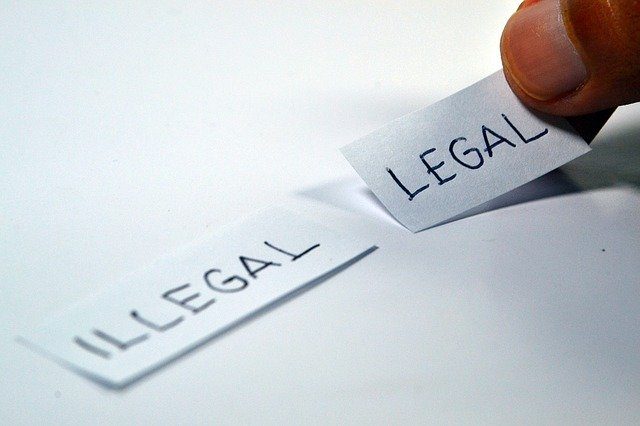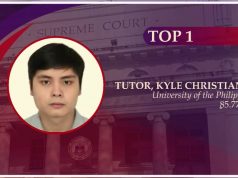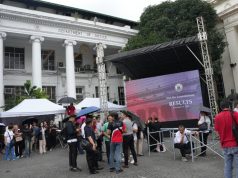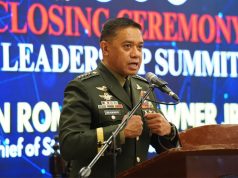(Updated July 24, 11:34 a.m.) More than a dozen petitions have already been filed challenging the constitutionality of the Anti-Terrorism Act of 2020, which President Rodrigo Duterte signed into law last July 3 amid wide opposition from influential legal groups in the country.
The new law, which had slipped into the passage amid the novel coronavirus pandemic, has been heavily criticized for its vague identifiers for terrorists and terror acts, as well as provisions deemed to be unconstitutional and could trample on Filipinos’ basic civil liberties.
Last July 18, Justice Secretary Menardo Guevarra announced that the controversial measure had taken effect because it was published online on July 3.
However, it was only published via the printed Official Gazette on July 6.
Former Supreme Court spokesperson Theodore Te pointed this out on Twitter.
“There is no law that says that the online OG substitutes for the printed OG under Art. 2 of the Civil Code,” Te said.
“Publication in the actual OG was on July 6, TF effectivity is July 22, not July 18. See Garcellano v HoR (Dec. 23, 2008), the internet is not the medium for publishing laws,” he added.
There is no law that says that the online OG substitutes for the printed OG under Art. 2 of the Civil Code. Publication in the actual OG was on July 6, TF effectivity is July 22, not July 18. See Garcellano v HoR (Dec. 23, 2008), internet is not the medium for publishing laws. https://t.co/eSb2ECiujl
— Theodore Te (@TedTe) July 17, 2020
Following continued widespread opposition, government agencies and high-ranking officials tried to assure the public that they should not fear the law’s provisions.
Senator Panfilo Lacson and Senate President Vicente Sotto III, one of the primary authors of the new measure, also welcomed the passage of the counter-terrorism law.
Meanwhile, National Security Adviser Hermogenes Esperon Jr. also said that “law-abiding” Filipinos have nothing to fear.
“Kung tahimik naman sila, huwag sila mababahala. Kung ang pakay mo bilang aktibista ay magsaad ng iyong mga hinaing, social injustices, or request for better treatment or ideas, papayagan natin ‘yan,” he said.
Since being signed into law, activists, concerned Filipinos and legal organizations have planned to challenge the anti-terror law before the Supreme Court and sought to veto it altogether.
List of petitioners so far
- Private law firm Calleja Law Firm including Ateneo law professor Atty. Howard Calleja, University of the Philippines law professor Atty. Christopher Lao and Brother Armin Luistro of the De La Salle University
- Albay 1st District Representative Edcel Lagman
- Faculty members from the Far Eastern University-Institute of Law who were led by Dean Mel Sta. Maria despite retiring from active law practice
- Six representatives from Makabayan bloc who were led by House Deputy Minority Leader Carlos Zarate(Bayan Muna party-list)
- Rudolf Jurado, Duterte’s former government corporate counsel
- Framers of the current 1987 Constitution—Felicitas Arroyo, Teodoro Bacani, Florangel Rosario Braid, Edmundo Garcia, Jose Luis Gascon, Christian Monsod and Bernardo Villegas
- Labor rights groups Center for Trade Union and Human Rights (CTUHR) and Pro-Labor Legal Assistance Center
- Sanlakas Party-list
- Big labor groups The Federation of Free Workers (FFW), Nagkaisa Labor Coalition (Nagkaisa) and Kilusang Mayo Uno (KMU)
- Lawyer Jose Ferrer Jr.
- Progressive organizations Bagong Alyansang Makabayan (BAYAN), Movement Against Tyranny, Karapatan, which are represented by the National Union of People’s Lawyers, one of the largest law organizations in the country
- Retired Supreme Court justices—Antonio Carpio and Conchita Carpio-Morales with professors from the University of the Philippines College of Law
- Student councils and groups from UP-Diliman, Ateneo de Manila University, De La Salle University and University of Santo Tomas
- National Union of Journalists of the Philippines members
- Rights lawyers Chel Diokno and Erin Tañada, and Rep. Kit Belmonte (Quezon City), who were represented by the Free Legal Assistance Group
- Lawyers Algamar Latiph, Batuas Lucman, Musa Malayang and Dalomilang Parahiman from the Bangsamoro region
- Alternative Law Groups, a coalition of 23 legal resource non-governmental organizations including the Ateneo Human Rights Center and the Philippine Legal Resources Center.
- A group of church leaders
- Women’s group Gabriela










